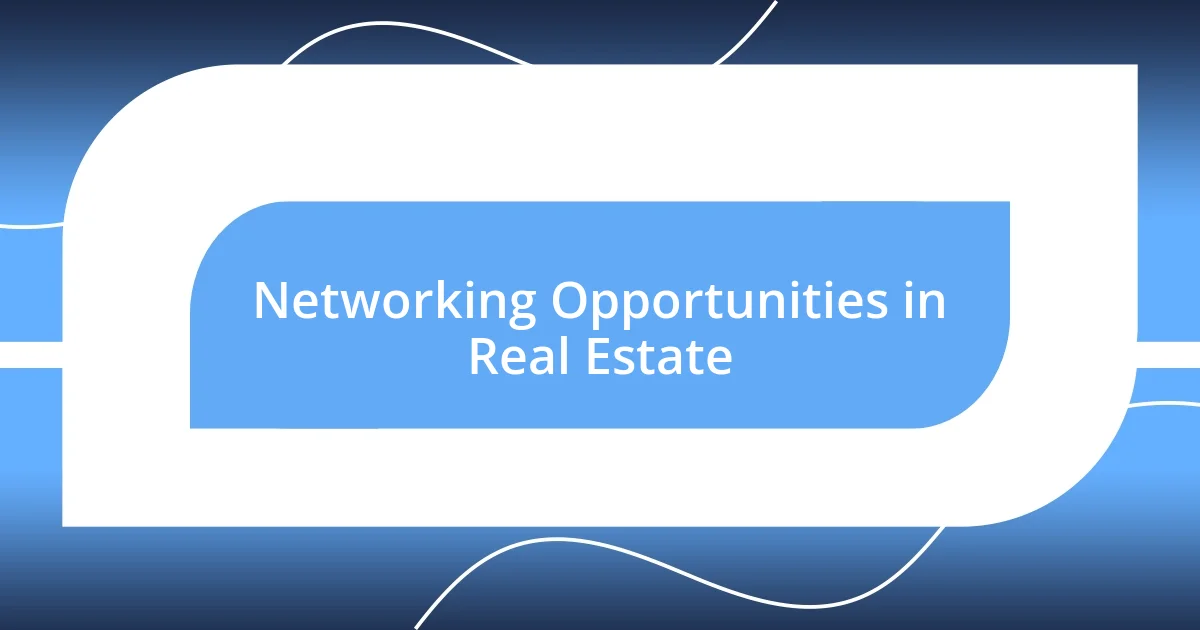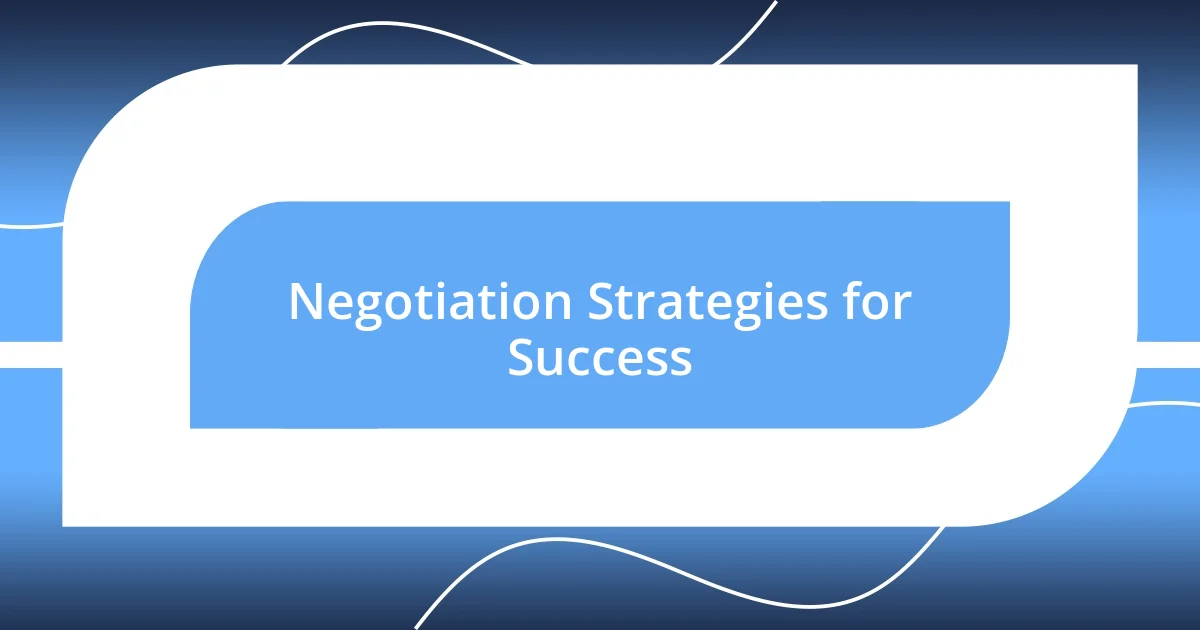Key takeaways:
- Commercial real estate is vital for business success, with location and market analysis playing crucial roles in investment decisions.
- Networking in real estate fosters valuable relationships, insights, and support that enhance personal and professional growth.
- Effective negotiation strategies, including preparation, rapport-building, and flexibility, are essential for achieving successful outcomes in commercial real estate deals.

Overview of Commercial Real Estate
Commercial real estate (CRE) encompasses properties used exclusively for business purposes, including office buildings, retail spaces, and warehouses. It’s fascinating to think about how these spaces shape the economy—when I walk through a bustling shopping center, I can’t help but feel the pulse of community interaction and commerce. What role do you think these spaces play in our everyday lives?
One aspect that stands out to me is the diverse nature of CRE investments. Unlike residential real estate, where a family seeks a home, businesses look for specific qualities—location, size, and accessibility. When I attended my first commercial real estate class, the instructor shared a story about a local café that succeeded by strategically choosing its location. It made me realize how vital these decisions are for a business’s growth. Have you ever thought about how much a business’s success can hinge on its physical environment?
The financial aspect of commercial real estate can be daunting yet intriguing. Investors often evaluate properties based on yield and market trends, which can feel like deciphering a complex puzzle. I remember poring over spreadsheets in class, learning terms like “cap rate” (capitalization rate), and feeling a mixture of anxiety and excitement. Isn’t it empowering to realize that each data point contributes to a larger picture? Understanding these fundamentals opens the door to making informed investment decisions.

Networking Opportunities in Real Estate
Networking in real estate offers an incredible opportunity to connect with industry professionals—something I didn’t fully understand until I attended my first conference. I remember standing in a room filled with seasoned investors and developers, feeling out of my depth but excited. Each introduction led to conversations that opened doors to potential partnerships, mentorships, and even friendships. It truly highlighted to me how vital these relationships are in navigating the complexities of commercial real estate.
Engaging with peers and experts during networking events provides not just knowledge but real-life experience. For instance, I once met a successful real estate entrepreneur who shared their journey of overcoming initial failures, a story that grounded my own ambitions. This personal touch made the information easier to digest and relatable. It made me realize that each connection can lead to shared wisdom and insights that textbooks alone can’t provide.
Moreover, the ongoing support from my networking circle has been invaluable. I often find myself reaching out for advice or collaboration, which has helped me grow both personally and professionally. The beauty of networking is that it’s reciprocal; as I share my own experiences, I help others while continuously learning in return. Investing in these relationships has enriched my career in ways I could never have anticipated.
| Networking Opportunity | Description |
|---|---|
| Conferences and Workshops | Relevant industry events where you can meet professionals and learn from experts. |
| Online Networking Platforms | Websites and apps allowing for connections, webinars, and collaboration across the globe. |
| Local Real Estate Meetups | Community gatherings that foster personal relationships and local market insights. |

Understanding Market Analysis Techniques
Understanding market analysis techniques was a game-changer for me in commercial real estate. As I dove into the intricacies of evaluating market conditions, I found myself reflecting on the critical role data plays. I remember grappling with concepts like supply and demand dynamics—realizing that a simple shift in these factors could dramatically impact property values and investment potential. It felt like looking through a lens that sharpened my understanding of trends; I began to see how these elements create a story about a market’s potential.
To effectively analyze a market, I learned to focus on several key factors:
- Demographics: Understanding the population density and characteristics helps gauge the target market for any investment.
- Economic Indicators: Monitoring local employment rates, income levels, and economic growth offers insight into market stability and potential.
- Comparative Market Analysis (CMA): Analyzing similar properties to understand pricing trends and competition is crucial for informed decision-making.
- Absorption Rates: This indicates how quickly available properties are being leased or sold, providing a pulse on market demand.
- Market Trends: Keeping an eye on emerging trends—like shifts toward remote work—can signal opportunities or risks in specific sectors.
Grasping these techniques transformed my perspective. I recall a project where I applied these principles to analyze an up-and-coming neighborhood. I felt a thrill as I pieced together data, uncovering potential for value increases before others caught on. It affirmed for me that these skills are not just for investment but for understanding how communities evolve.

Negotiation Strategies for Success
Negotiation strategies are an art form in commercial real estate, and mastering them can truly set you apart. One tactic that I’ve found invaluable is preparation; it’s essential to know not just your position but also your counterpart’s motivations. I once walked into a meeting less prepared than I should have been, and let me tell you, I could feel the difference. The other party was clearly confident, and I struggled to make my points heard. Observing their body language, I realized that having a deeper understanding of their needs could have turned the tide in my favor.
Another approach that’s proven beneficial for me is building rapport before diving into the nitty-gritty of negotiations. When I first began in this field, I approached negotiations too rigidly, focusing purely on numbers. But after attending a workshop on soft skills, I shifted my strategy. I learned the value of lighthearted conversation and finding common ground first. One time, a simple comment about our mutual love for a nearby coffee shop broke the ice and relaxed the atmosphere, leading to a more constructive discussion. Isn’t it fascinating how a genuine connection can lead to better outcomes?
Lastly, I’ve come to appreciate the importance of flexibility in negotiations. I recall a negotiation where initially, I was set on a specific price. But as the conversation unfolded, I discovered other areas where I could add value — like offering longer lease terms or flexibility in terms of amenities. This willingness to adapt shifted the focus from just price to overall value, ultimately leading to a win-win situation. Have you ever experienced a moment in negotiations where being adaptable changed the game for you? It’s a reminder of why keeping an open mind is crucial in these discussions.














